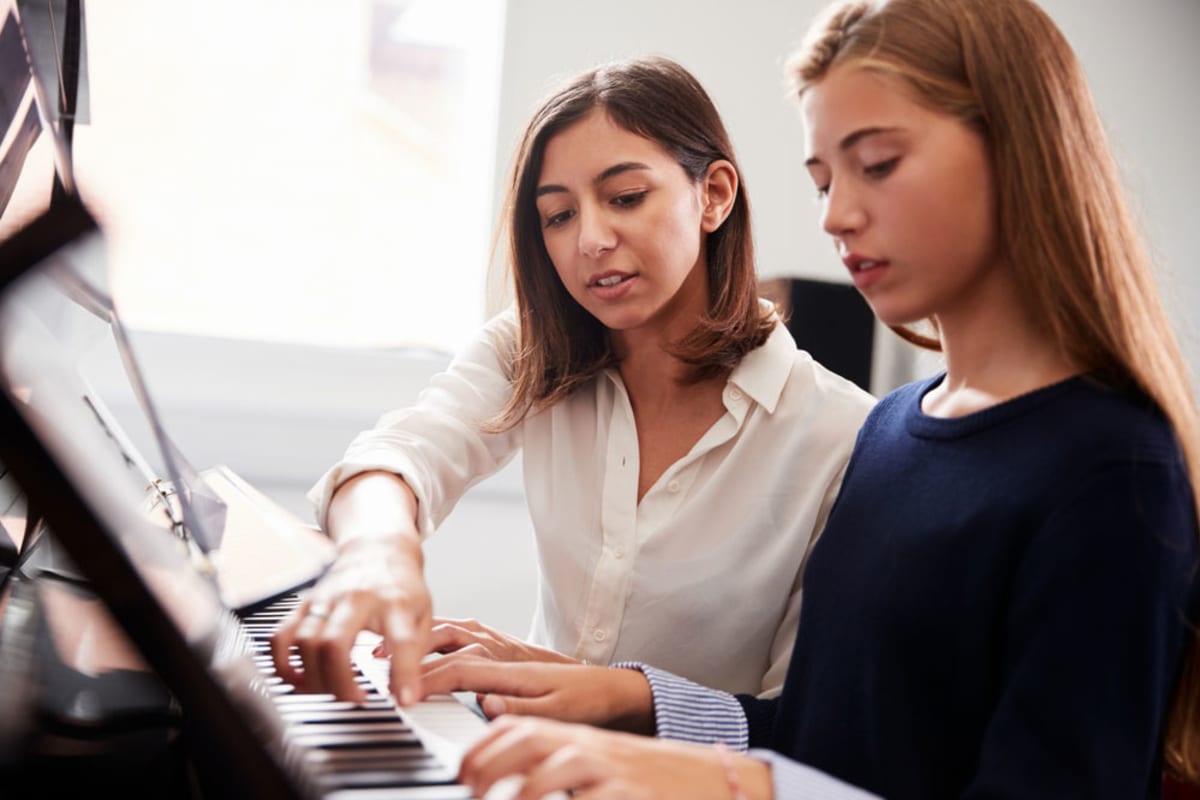
Find music lessons in Detroit, MI
Find music lessons in Detroit, MI
Confirm your location to see the best music classes near you.
Zip code
Find music lessons in Detroit, MI
Confirm your location to see the best music classes near you.
Zip code
Top 10 music classes in Detroit, MI
Students agree: these Detroit music lessons are highly rated for knowledge, experience, communication, and more.
5.0Exceptional(5)
5+ years in business
Serves Detroit, MI
Sangita P. says, "Mr. Stephen is an incredible teacher. He is professional and lets you take your time when learning. I have flown through my Bach book and have learned so much about sight reading. I have learned to read notes fast and accurately and am able to play songs I never thought I could!" Read more
Six String School
5.0Exceptional(12)
19 hires on Lessons.com
4+ years in business
Serves Detroit, MI
Toru I. says, "Great great teacher, always fun to be on lesson with.
Learning so many things every time and challenging.
Always listen what I do and what I want to do,
and professionally customize the lessons for what I need.
Highly recommend!!!" Read more
Michael Schultz Music
5.0Exceptional(5)
19 hires on Lessons.com
9+ years in business
Serves Detroit, MI & Online
Jeff S. says, "Great process. Couldn't have worked out better " Read more
Paper Bag Productions
34+ years in business
Serves Detroit, MI
I've played piano for 60 years and taught for over 40, 16 at The University of Michigan. I teach all levels and all genres of music from Rock to Rachmaninoff.
Maestro Gerald H. Goslin
1 hire on Lessons.com
35+ years in business
Serves Detroit, MI
With over 51 years of career in music; Maestro Gerald H. Goslin, an internationally recognized concert pianist and professor, has been performing in various concerts, lectures and workshops around the world. He has been Adjunct Professor of Piano at Oakland Community College from 1983-2010. Also, he’s been a Professor of Piano, Organ and Music Theory at Cameron’s Music in Livonia from 1998-2010. Apart from teaching, he has two recordings on his name along with upcoming CD and video release this year. He’s been an esteemed judge for ‘The Leontyne Price Emerging Arts Vocal Competition’ from 1986-2010 and ‘The Verdi Opera Association Vocal Compe...
Paper Bag Productions
5.0(1)
7 hires on Lessons.com
34+ years in business
Serves Detroit, MI
Daveda B. says, "Very reasonable prices. " Read more
John Devine Guitar Lessons
5.0(2)
7 hires on Lessons.com
23+ years in business
Serves Detroit, MI & Online
Nasser M. says, "John was a fantastic teacher, I learned a lot of interesting things I wouldn't have learned on my own. Thank you John! - Nasser" Read more
The Practice Room09
4.7(3)
16+ years in business
Serves Detroit, MI & Online
Ray K. says, "Michelle is great with my sons (12 and 14) as they are learning piano and guitar. Friendly, punctual, and experienced!" Read more
High Caliber Music
9+ years in business
Serves Detroit, MI & Online
My lessons are unique because the knowledge has been passed to me from a mentor who toured with a highly famous group from the 1960s-1970s.
I played 18 years, but the past 4 with him blew my mind, and the content is very specific, easy, and step by step.
I have always loved Rock N Roll music, and playing the guitar. Everything about it sets me on fire and it is magical when people play together that way.
Ron English Guitar Lessons
Serves Detroit, MI
My teaching approach:
My teaching approach: equip the student with skills and materials for the kind of music he or she wants to play. I usually require students learn reading skills along with technical studies. My pro experience includes recording with DSO and Gladys Knight, & road work with The Four Tops, Martha Reeves, and the Supremes' Mary Wilson, as well Michigan based jazz artists and broadway show companies.
My influences are:
As a player: Charlie Christian, Barney Kessel, Kenny Burrell, B.B. King, Joe Pass, Wes Montgomery, Steve Cropper, Pat Metheny, Grant Green. As a teacher: Mel Bay, Joe Fava, and my father, Norman English.
My gui...
Your Music Lessons questions, answered
Answers to commonly asked questions from the experts on Lessons.com.
Reviews for Detroit music classes
Recent success stories from people in the Detroit area.
Raytal H.
His attention to detail and his student . His love for the music/ piano. How friendly he and the whole family are.
Stephan Bruce Becker
Raymond F.
Adam is great teacher, Iam a slow learner .Adam took the time and has the patience to teach me.
Would recommend Adam any day or week and twice on sunday.
Six String School
Steven B.
Highly recommended, he’s easy to learn from, cares and has a great passion for teaching, I got some stuff to work on until my next lesson with him, anyone looking for a great teacher come to Michael.
Michael Schultz Music
Dan R.
John is very patient and encouraging. Took lessons about 11 years ago and nothing was really explained, and I didn't learn very much. John answers my questions.
John Devine Guitar Lessons
Jess K.
Knows her stuff, timely, professional!
The Practice Room09
How Lessons.com works
Search
Search, get cost estimates, contact teachers, and book—all for free.
Compare
View profiles, read reviews, check qualifications, and see prices before hiring.
Hire
Ask questions, confirm their availability, and hire the right tutor when you're ready.